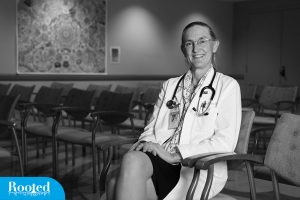Laura Hanson has been contributing to research at Carolina for 31 years.

Laura Hanson has worked for UNC-Chapel Hill for 31 years in a variety of roles, most recently as a professor of geriatric medicine and the medical director of the Department of Medicine’s Palliative Care and Hospice Program. She is also a senior research fellow at the Cecil G. Sheps Center for Health Services Research and a member of the Lineberger Comprehensive Cancer Center.
What brought you to Carolina?
A native Kansan, my first introduction to North Carolina was arriving here as a Duke University undergraduate. I then attended Harvard Medical School and stayed in Boston for my residency at the Brigham & Women’s Hospital. But my husband, David — a native North Carolinian — lured me back.
Carolina was my first choice for a geriatric medicine fellowship because of the remarkable flexibility to combine clinical geriatrics with public health research training. I was thrilled to join the School of Medicine faculty in 1992, where I’ve worked ever since.
How has your role here changed over the years?
My work has always combined clinical service for medically complex older adults with research to inform and improve their health care experience. My early projects analyzed treatment decision-making and outcomes, exposing opportunities for improvement.
In 1997, I was awarded a career development grant from the Open Society Institute to focus on improving care for dying patients in nursing homes. This funding introduced me to the emerging field of palliative medicine and a national network of young investigators seeking to develop new approaches to address pain, suffering, and health care for people living with serious and life-limiting illnesses. In collaboration with Stephen Bernard in UNC Oncology in 2001, I founded the first clinical palliative medicine service at the UNC Medical Center.
Since then, I’ve transitioned my research to focus on interventions to improve care for people with serious illness. My research team has done a series of quality improvement studies at the UNC Medical Center resulting in enhanced palliative care access for patients with cancer. Some of this work has specifically focused on overcoming cancer disparities for African Americans. We’ve also led several clinical trials to improve communication and treatment decision-making for people with dementia and their families.
What’s kept you at Carolina?
The people. I think that the adjective I hear most often to describe Carolina culture is “collaborative.” I didn’t really grasp the value of our health affairs campus when I first arrived, but interdisciplinary collaboration is essential to work in geriatrics and palliative medicine. At Carolina, it is remarkably easy to engage with experts in diverse disciplines of health care research, and I’ve found fruitful collaborations with colleagues in oncology, nephrology, primary care, public health, nursing, social work, and pharmacy. We’re all within walking distance of one another, working together to create high-quality clinical care and research.
What contribution are you most proud of?
We are leading the first multi-site clinical trial of palliative care for people with Alzheimer’s disease and related dementias, funded by the National Institute on Aging. This study is important because palliative care clinicians address the suffering and distress caused by this incurable condition. They find information and practical support to help patients with physical and psychiatric symptoms and their families make difficult advance care planning choices. The study is active at the UNC Medical Center, the University of Colorado-Denver, Massachusetts General Hospital, and Indiana University.
What is a uniquely Carolina experience you’ve had?
To work every day with people who quietly and intensely focus on the work at hand, exemplifying the state motto of Esse quam videri, meaning “to be rather than to seem.” I distinctly remember a time I was in a research meeting with collaborators from Boston, and one of them commented that she was surprised by how many hidden gems were on faculty at Carolina. It didn’t surprise me.
Rooted recognizes long-standing members of the UNC-Chapel Hill community that have aided in the advancement of research by staying at Carolina. They are crucial to the UNC Research enterprise, experts in their fields, and loyal Tar Heels. Know someone we should feature? Nominate a researcher.
